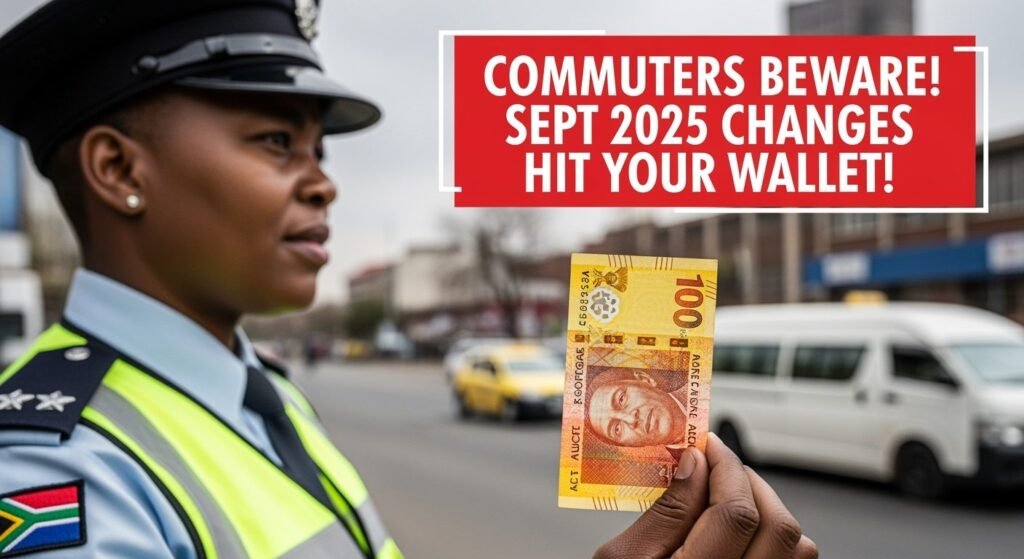South Africa traffic rule changes: If you’re a daily commuter in South Africa, I’ve got some important news that might affect your budget planning for next year. Starting September 2025, a comprehensive set of traffic rule changes will be implemented across the country, bringing with them increased costs for motorists. These changes are part of the government’s effort to improve road safety and infrastructure, but they will undoubtedly have a significant impact on your daily commuting expenses. Have you started thinking about how these new regulations might affect your monthly budget? The time to prepare is now, as these South Africa traffic rule changes will introduce new fees, adjusted fine structures, and additional compliance requirements for all road users.

What Are The New Traffic Rules Coming in 2025?
The South Africa traffic rule changes scheduled for September 2025 encompass several key areas that will directly impact daily commuters. First, there will be an increase in toll fees across major highways, with some routes seeing up to a 15% rise in costs. Second, a new electronic vehicle registration system will be mandatory, requiring all vehicles to carry updated RFID tags that will cost approximately R350 per vehicle. Third, stricter emissions standards will be enforced, potentially requiring older vehicles to undergo costly modifications or face hefty fines. Finally, a points-based driver penalty system will be introduced, where accumulating points for traffic violations could lead to additional surcharges on license renewals or even temporary suspension of driving privileges.
Why These Changes Will Increase Commuting Costs
The implementation of these new traffic regulations will increase commuting costs through both direct and indirect means. Directly, you’ll face higher toll fees, new registration costs, and potentially steeper fines for violations. Indirectly, the stricter emissions standards may force many commuters to invest in vehicle upgrades or maintenance that wasn’t previously required. The government has justified these increases as necessary to fund road infrastructure improvements and enhance overall road safety. However, economic analysts estimate that the average commuter could see their monthly transportation costs rise by 12-18%. For someone traveling daily between major urban centers, this could translate to an additional R500-R800 per month in commuting expenses, a significant burden during already challenging economic times.
When Will These Changes Take Effect?
The South Africa traffic rule changes will be implemented in phases starting September 1, 2025. The roll-out schedule has been designed to give commuters and businesses time to adapt, but it’s important to understand the timeline. The toll increases will take effect immediately on the launch date, while the new electronic vehicle registration system will have a three-month grace period ending November 30, 2025. The emissions standards enforcement will begin January 2026, giving vehicle owners additional time to make necessary modifications. The points-based penalty system will be introduced as a “warning period” for the first six months, with full financial penalties only applying from March 2026. Despite this phased approach, I recommend you begin budgeting for these changes well in advance, as the cumulative cost impact will be substantial once all measures are fully implemented.
How Can Commuters Prepare Financially?
| Preparation Strategy | Potential Savings |
|---|---|
| Carpooling arrangements | 30-50% on toll fees |
| Public transport alternatives | Up to 60% overall |
| Early vehicle compliance | Avoid rush penalties |
With these impending cost increases, financial preparation is essential. I suggest starting a dedicated “traffic rule change” savings fund, setting aside a small amount each month leading up to September 2025. For vehicle owners, scheduling emissions inspections early can help identify any needed modifications before the rush period begins. Many banks and insurance companies are already developing special financing options for vehicle upgrades required by the new regulations. Additionally, exploring alternative transportation methods like carpooling, ride-sharing services, or public transport could significantly reduce your exposure to these increased costs. Some employers are also considering transportation subsidies or remote work options to help employees manage these new financial pressures.
Real Impact on Daily Commuters
Consider the case of Johannesburg resident Thabo Molefe, who commutes daily from Soweto to Sandton for work. Currently, his monthly commuting costs average R2,200 including fuel, tolls, and vehicle maintenance. Under the new regulations, his costs are projected to increase to approximately R2,750 per month – a 25% jump that will significantly impact his household budget. To mitigate this, Thabo has already joined a carpooling group with four colleagues and is negotiating with his employer for two remote workdays per week. Through these proactive measures, he hopes to keep his actual cost increase to under 10% when the new traffic rules take effect in September 2025.




